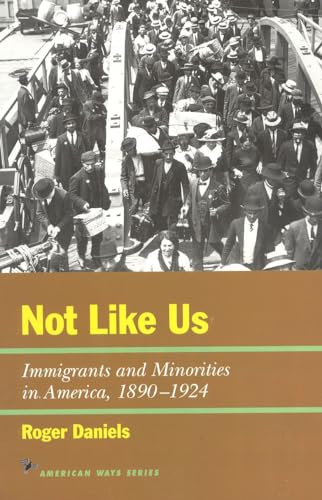Not Like Us
Immigrants and Minorities in America, 1890-1924 (American Ways)
Roger Daniels
BOOK REVIEW

In the tapestry of American history, the threads of diverse identities often intertwine, weaving a narrative rich in struggle, resilience, and transformation. Not Like Us: Immigrants and Minorities in America, 1890-1924 by Roger Daniels boldly confronts these threads, inviting readers into a seamless exploration of the immigrant experience in a burgeoning America-a land filled with dreams yet marred by prejudice and exclusion. This book isn't just a historical account; it's a passionate plea for understanding the soul of a nation shaped by its minorities.
Have you ever considered the silent battles fought by those who dared to cross the ocean, braving both peril and hope? Daniels's work is a weighty reminder of the tenacity displayed by millions who, between 1890 and 1924, contributed to the vibrant mosaic we now recognize as America. The narratives present in this book challenge you to see beyond simplistic labels and stereotypes, digging deep into the complexities of cultural identities that have long been relegated to the background of the American story.
Throughout its pages, Daniels illuminates the multifaceted lives of immigrants from various backgrounds-Italians, Jews, Chinese, and other ethnic groups. The author transports you back to times of fierce nativism and segregation, illustrating how societal norms dictated the acceptance, or more often, the rejection of these communities. The statistics are staggering: during this period, restrictive immigration laws and rampant xenophobia surged as America grappled with its evolving identity and values. The exploitation of these newcomers often transformed their dreams into nightmares.
As you turn each page, the emotive stories of these immigrants unfold, breaking your heart yet filling you with admiration. Imagine young men and women striving for a better life, only to be met with skepticism and hostility. Daniels doesn't shy away from showcasing the bitterness of discrimination and the heart-wrenching struggles of those deemed "not like us." This book serves as an urgent reminder of the ugliness of prejudice that continues to rear its head in modern discourse, forcing us to reflect on our shared humanity.
Critics and readers alike have found themselves captivated-and at times enraged-by Daniels's unapologetic candor. Some laud his deep dive into primary sources, as he describes the precarious lives of minorities under constant scrutiny from those who considered themselves "true" Americans. Others, however, argue that his passionate narrative sometimes glosses over systemic issues that remain unresolved today. However, no one can deny that Not Like Us demands acknowledgment and conversation-a crucial component for any society grappling with its identity.
As you engage with Daniels's arguments, consider the broader implications of his findings. This book is not merely an exploration of the past; it's a call to action, urging contemporary readers to challenge the status quo. It questions how definitions of "American" have shifted and continue to shift as new waves of immigrants settle in, reshaping the very fabric of society.
The backdrop of this profound exploration reflects the historical context of the Progressive Era, a time when America was on the brink of transformation yet held dearly to its prejudices. The choices made during this period would echo through generations, influencing policies and societal attitudes long after the dust of the past had settled.
In a world that often feels polarized and fragmented, Daniels's work stands as a reminder of the strength found in diversity. It urges us to embrace the myriad cultures and stories that enrich our nation-stories that hold the potential to bridge divides if we allow them to be told.
The emotional resonance of Not Like Us compels you to reexamine your own views about immigration, identity, and belonging. The importance of empathy cannot be stressed enough. As you reflect on the trials faced by these early American immigrants, you may also find your own beliefs challenged and evolved. There's an undeniable call to solidarity wrapped within these pages-a heartfelt invitation to connect on the shared human experience.
If you're seeking to expand your understanding of America's cultural landscape, or simply want to feel the raw pulse of human tenacity, then Daniels's book should be at the top of your reading list. Its powerful lessons transcend the confines of its historical narrative, reminding all of us that the quest for acceptance and understanding is a timeless struggle-a struggle that continues today.
Don't let the voices of the past fade silently into history. Confront their stories, and you may just ignite a powerful dialogue about the future of our shared existence. Embrace the transformative power of Not Like Us-a vital chapter in America's ongoing story, and one you won't want to miss. 🌍
📖 Not Like Us: Immigrants and Minorities in America, 1890-1924 (American Ways)
✍ by Roger Daniels
🧾 192 pages
1998
#like #immigrants #minorities #america #18901924 #american #ways #roger #daniels #RogerDaniels